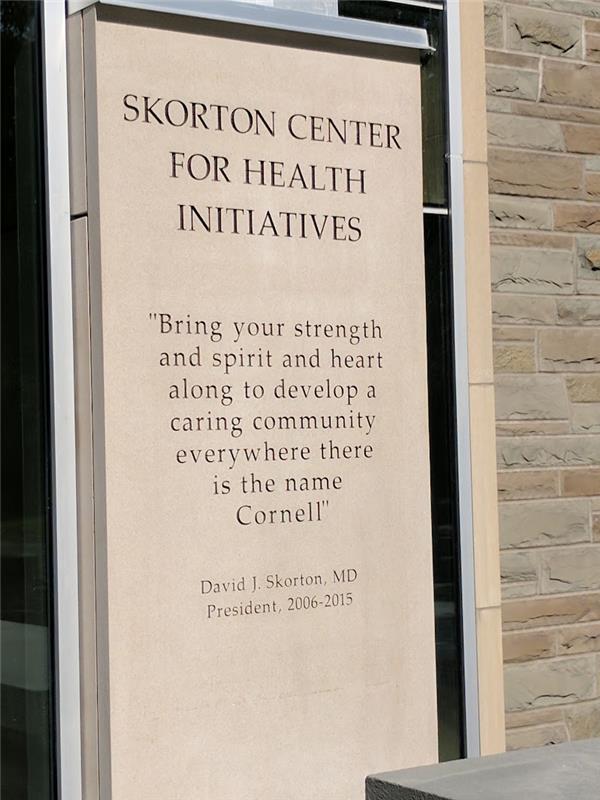A Legacy in Motion: 10 Years of the Skorton Center Transforming Campus Health

For the past decade, Cornell Health’s Skorton Center for Health Initiatives—named by Cornell’s Board of Trustees in 2015 for then-outgoing university president David J. Skorton, MD—has developed dozens of innovative programs, health campaigns, policy initiatives and collaborations to advance student and campus health. And with the hire of its new director, Jennifer Austin, in December 2024, the Skorton Center staff continue to embrace new opportunities to advance student and campus well-being.
 A member of the health service team for over two decades, Austin fully appreciates that the roots of the Skorton Center run deep. Planted in 1980 with the hiring of Cornell’s first health educator, Janis Talbot, the center has grown through 35 years of ground-breaking work in Health Promotion—a non-clinical department among Cornell’s health services.
A member of the health service team for over two decades, Austin fully appreciates that the roots of the Skorton Center run deep. Planted in 1980 with the hiring of Cornell’s first health educator, Janis Talbot, the center has grown through 35 years of ground-breaking work in Health Promotion—a non-clinical department among Cornell’s health services.
Austin was part of this early work, working with former team members to develop key strategies for Cornell. She embraces The Skorton Center’s central mission and four-pronged strategy, established and advanced by its first director, Timothy Marchell ’82, and harnessed by its second, Julie Edwards, as an engine to advance current Health Promoting Campus initiatives across Cornell.
Through its four commitments—to institutional leadership, education, research, and public engagement—the Skorton Center develops and evaluates approaches to address widely-recognized barriers to student and campus well-being, including alcohol and other drug (AOD) misuse, hazing, mental health challenges and sexual violence.
“These challenges are not unique to Cornell, so the comprehensive public health approaches and data-informed strategies we developed to affect change on this campus also make significant contributions to the wider fields of health promotion and public health, illustrating our commitment to public engagement,” said Austin. “It’s an honor to be charged with meeting the challenges of this particular moment in our university’s history with tools and hard-won knowledge that have served Cornell so long and so well.”
During his presidency, David J. Skorton, a physician by training, provided national leadership on college health issues, elevating health as central to the university’s mission. Numerous national studies highlight the impacts of key well-being variables on students’ ability to flourish academically and socially.
“We collect data about what’s working well on campus, as well as where there is room for improvement,” said Austin. “For example, campus hazing poses a significant threat to student safety across the nation and is antithetical to a healthy community. Regular data collected in Cornell surveys helped to shape the first-ever social norms approach to hazing on a college campus.
“This research-informed effort—described in a 2022 Journal of American College Health article about Cornell’s Hazing Prevention Model—has shifted Cornell students’ attitudinal beliefs about hazing over the past decade,” Austin said. “It is a model recommended for other campuses by the national organization, Stop Hazing, and Cornell’s commitment to the transparent reporting of hazing—first developed and advocated 20 years ago by the staff in health services who later led the Skorton Center—is now a key component of the national Stop Campus Hazing Law, signed by former President Biden in December 2024.
Skorton’s early pronouncement of Cornell as a “Caring Community” supported efforts to prevent health threats like hazing and suicide. It also provided a moral aspiration for a campus culture in which every member shares responsibility for fostering health and well-being.
“The ‘caring community’ language underscored our interdependence,” said Austin. “Campus policies and practices affect the well-being of individuals. At the same time, regardless of campus role, the actions of individual students, faculty, and staff members shape the collective health of our community. We can’t underestimate the interconnectedness of these variables.”
This ethos of caring unified Cornell during the challenges of Skorton’s tenure, which included the H1N1 pandemic and several tragic student deaths related to suicide and hazing, as well as institutional leadership and commitment to addressing high-risk alcohol use and preventing sexual violence. Today, as campus partners collaborate to advance new Health Promoting Campus initiatives, Skorton’s call to action continues to resonate. “The Skorton Center’s ongoing work will help ensure his vision endures and evolves in support of generations of Cornellians yet to come,” Austin said.
